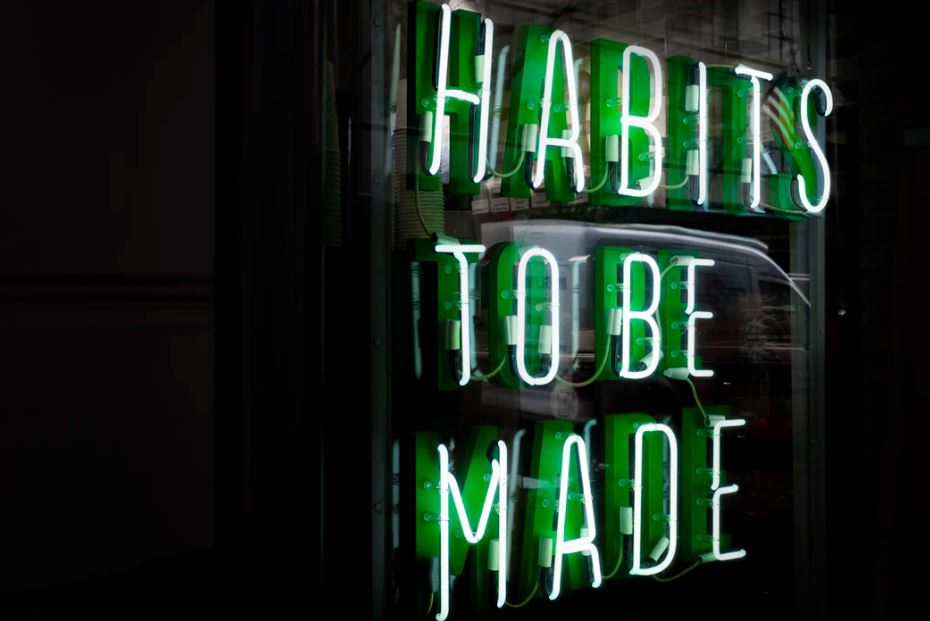Today’s Big Idea—To a great extent, your life is the sum total of your habits. 99% of the time, people don’t change overnight. Change is almost always cumulative, it occurs over time. And your habits, good or bad—over time, will make or break you.
Even centuries ago Aristotle observed, “We are what we repeatedly do. Excellence then, is not an act, but a habit.”
If you want to know where you will be 20 years from now. Take a good look at your habits. You might have goals, but your habits are the systems that shape your trajectory.
Your return on investment (for anything) is almost always related to the amount of time you spend on it.
Tiny daily habits will support or sabotage our goals—the big changes we want to make in our lives. Habits are worth understanding and transforming, since they will add up to become our legacy.
The partner you are, the parent you are, the friend you are, the person you are remembered as—will all be directly linked to the habits you cultivate.
Good habits have the power to catapult us into peak physical fitness, create a thriving marriage, or build strong bonds with our children. Bad habits literally have the power to destroy or shorten our lives.
As a leader (at home and at work)—how many great things can you accomplish without the persistent power of great habits?
I think it’s fair to say, there are few living people who understand habits better than journalist Charles Duhigg, who wrote The Power of Habit (2014). Widely recognized as the most comprehensive book written on habits.
Have you ever had great difficulty breaking a bad habit? Here’s some of the science that explains it:
In 1949, Canadian neuropsychologist Donald Hebb coined a phrase I heard repeatedly in graduate school, “Neurons that fire together, wire together.” In other words, as you perform daily routines or habits, the physical connections in your brain get stronger (think of a fiber optic cable that gets thicker every time a signal runs through it)…meaning that you are much more likely to do the same behavior in that same situation the next time.
Duhigg explains it this way—Think of the first time you learned to parallel park. At first it seems very difficult, then over time, the decision-making part of your brain begins to go to sleep and the part of the brain responsible for patterns and routines takes over. Your brain does this to save energy, so you don’t have to think so hard about your basic daily activities.
Everything from brushing your teeth, to gambling, to parallel parking follows this same behavioral and neurological process.
Think of it this way—a habit is a choice we deliberately make, and then stop thinking about at some point, but keep doing every day.
Incredibly—your brain is about 3% of your total body weight, but consumes about 25% of your daily energy, so it is highly motivated to look for ways to conserve your energy.
Duhigg says that every habit can be broken down into 3 parts—
- A cue
- A routine (your behavior or habit)
- And a reward
When changing a habit, he recommends the following framework:
- Identify your routine (the behavior you want to change)
- Experiment with different rewards
- Isolate your cue
- Have a new plan
In our busy and noisy lives, it can be really hard to pin down exactly what cues and rewards are motivating our behavior. But Duhigg’s (and others) research show that habits are clearly linked to 5 things—Location, Time of Day, Emotional State, Other People, and Immediately Preceding Action.
For example, researchers have shown that it’s much easier to change a habit when you go on vacation (i.e. location)!
You can use the following 5 questions to help you identify your cues and rewards:
- Where are you?
- What time is it?
- What is your emotional state?
- Who else is around?
- What action directly preceded your urge?
To illustrate this point, Duhigg tells a funny story about his habit of buying a cookie every day at 3pm at his office cafeteria. Using these questions, he eventually identified that he just needed a break from his computer to socialize with people at 3pm daily, so he began chatting with coworkers instead of eating cookies every day! The result? He lost weight and connected more with his coworkers!
Take action now
I recommend you pick a habit that you want to change. Then use the 5 questions above to write your answers in a journal for a week. This should help you identify your cues. Then begin to experiment with different rewards for yourself to find out what you are really wanting from your habit. Then create a new plan—i.e the new habit you want to form—by changing your location, your rewards, or eliminating cues like people that may trigger the habits you want to change!
One last thought to mention, it’s always easier to start a new habit (or replace it) than to stop a bad one. For example, one study showed that people were more successful in stopping caffeine intake by drinking decaf coffee every morning instead of stopping their entire morning coffee routine.
Let me reiterate—learning how to change your habits might be one of the most important things you ever do for your life, and your leadership impact.
“Sow a thought and you reap an action; sow an act and you reap a habit; sow a habit and you reap a character; sow a character and you reap a destiny.” –Ralph Waldo Emerson
Have a great weekend!
Parker
*If you have enjoyed Parker’s blog, check out The Next Peak Podcast that Parker co-hosts. We interview successful leaders and discuss research-based principles that help people win in the workplace without compromising the things that matter most—relationships, a life of purpose, and health.
Suggested Resources
- The Power of Habit—Why we do what we do in life and business. Charles Duhigg
- Tiny Habit Academy, Stanford researcher BJ Fogg’s website
- The Miracle Morning by Hal Elrod
- Atomic Habits by James Clear




